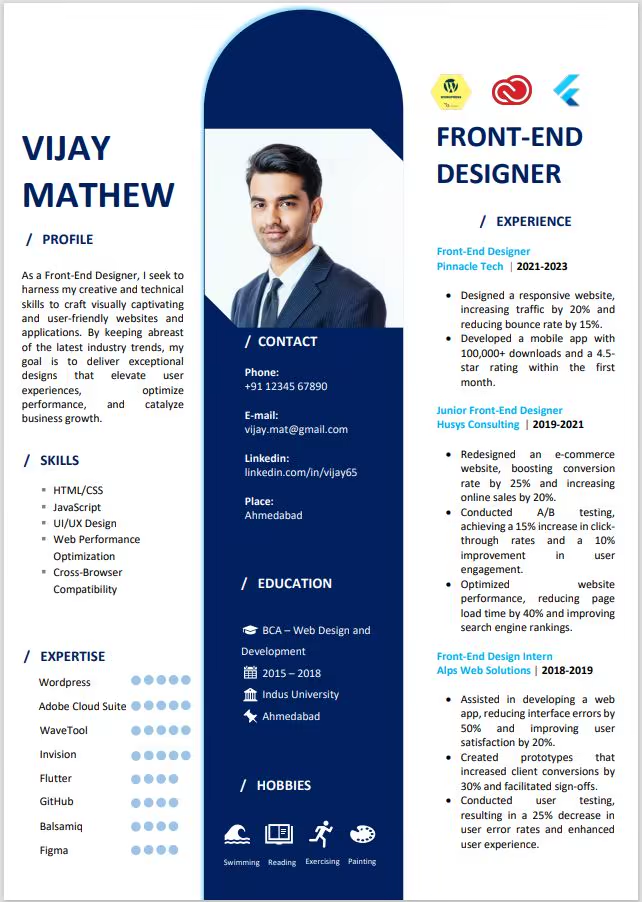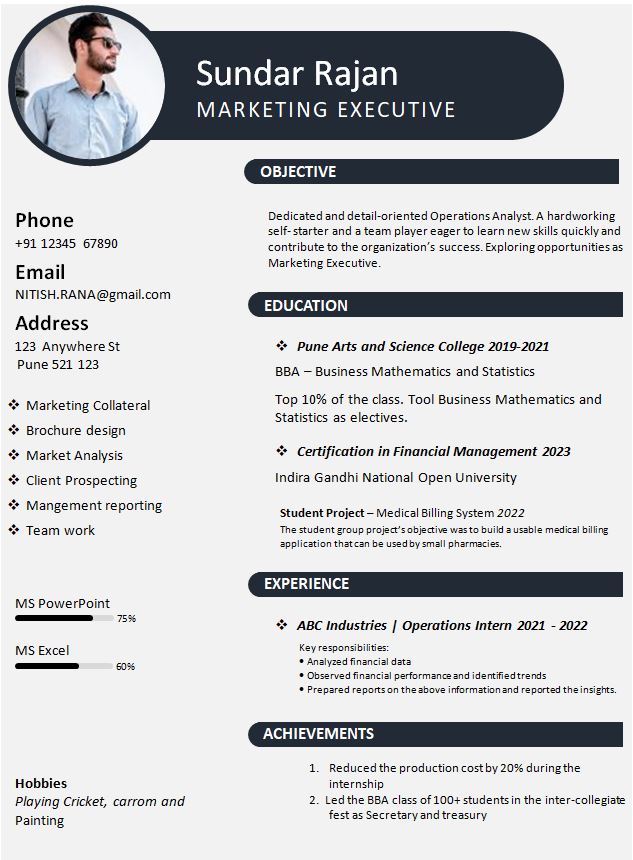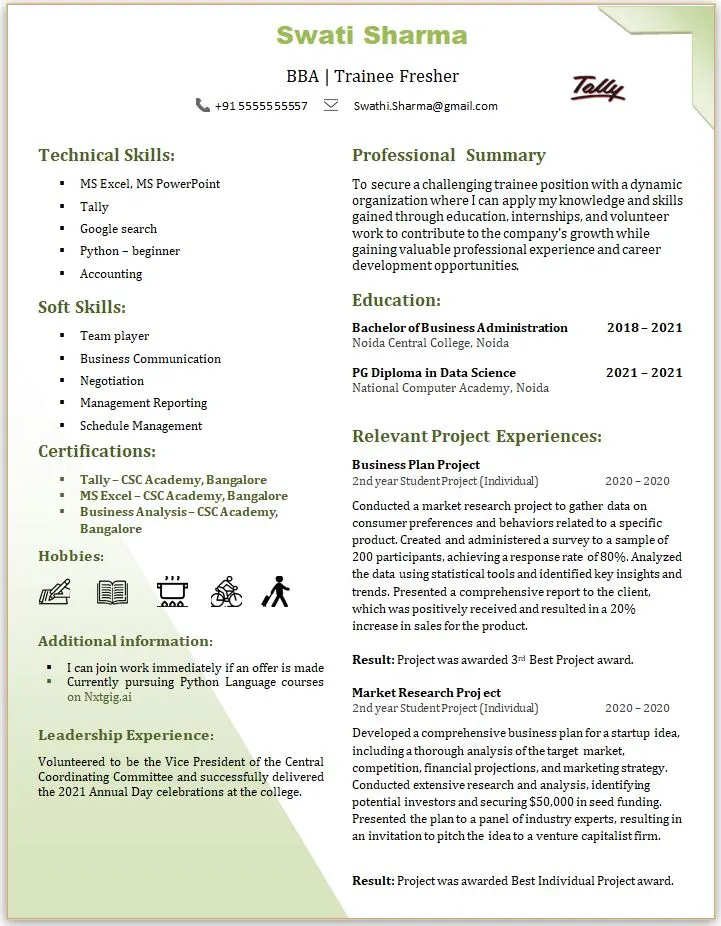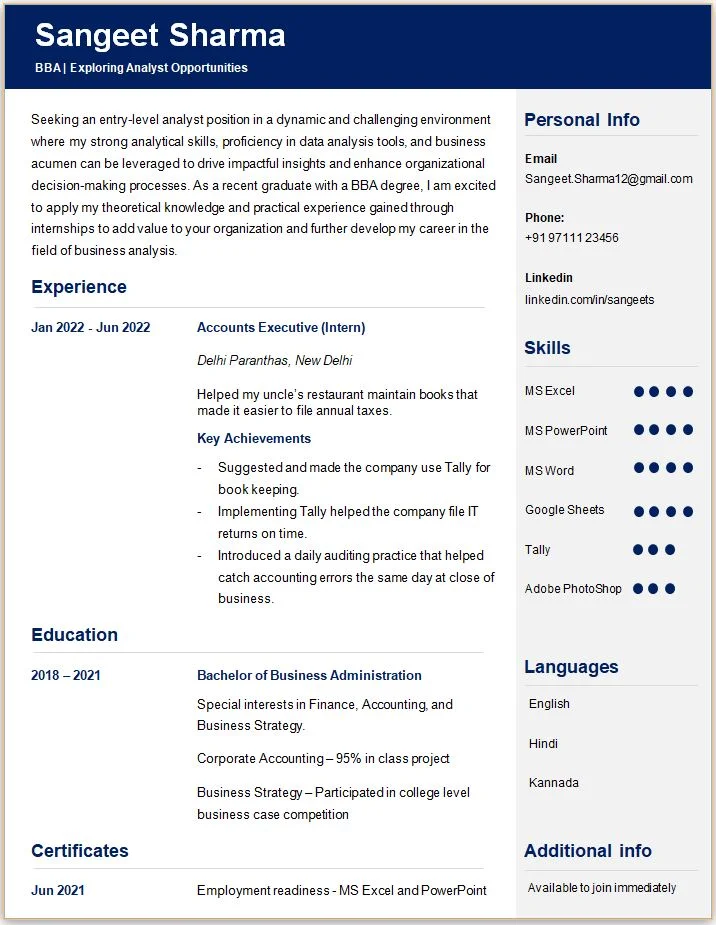Modern Resume
BCA Sample Resume
Front End Engineer
FEng


Objective
If you don't like the one that the template has, you can consider using this one below.
Motivated Front-End Engineer with a passion for crafting responsive and visually appealing web applications. Seeking an opportunity to leverage my proficiency in HTML, CSS, and JavaScript to create seamless user experiences that align with modern design principles. Dedicated to collaborating with cross-functional teams to deliver high-quality code and innovative solutions that enhance user engagement and drive business success.
Education
BCA, BE, ME, BTech, MTech, Bachelor of Computer Applications, Bachelor of Engineering
Skills
If you are aiming to become a front-end engineer job, these are the skills that are most essential on your resume.
Incorporating these skills into your front-end engineer resume showcases your ability to create well-designed, interactive, and performant web applications while ensuring a positive user experience.
Tailoring your resume to highlight these skills will demonstrate your qualifications and expertise to potential employers in the field of front-end development.
HTML/CSS:
HTML (Hypertext Markup Language) and CSS (Cascading Style Sheets) are the fundamental building blocks of web development. As a front-end engineer, you'll be responsible for creating the structure (HTML) and styling (CSS) of web pages. Proficiency in HTML and CSS is essential to ensure that web content is well-structured, visually appealing, and responsive across different devices.
JavaScript:
JavaScript is a versatile programming language that adds interactivity and dynamic behavior to web pages. As a front-end engineer, you'll use JavaScript to create features like interactive forms, animations, and real-time updates. JavaScript is crucial for enhancing user experiences and making web applications more engaging and functional.
UI/UX Design:
User Interface (UI) and User Experience (UX) design are critical aspects of front-end development. Understanding design principles and user-centered approaches helps you create intuitive and aesthetically pleasing interfaces that provide a positive experience for users. Collaborating with designers and being able to translate design mockups into functional UI elements is a key skill for a front-end engineer.
Web Performance Optimization:
Front-end engineers need to optimize web pages for fast loading times and optimal performance. This involves techniques like optimizing images, minifying code, and reducing unnecessary network requests. Knowledge of performance optimization ensures that users have a smooth and efficient experience on your web applications.
Cross-Browser Compatibility:
Different web browsers (such as Chrome, Firefox, Safari, and Edge) can render web pages differently. Ensuring cross-browser compatibility means that your web applications look and function consistently across various browsers and devices. This skill is crucial for delivering a seamless experience to users regardless of their chosen platform.
Projects
If you are still in college and want to become a front end engineer, definitely do consider picking up and working on a project or two.
If you do not have a lot of experience coding, now is the time to get started. We would like to give you these two projects to focus on. Project Idea 1: PHP and MySQL - Online Portfolio and Blogging Platform
Description:
Create a personal online portfolio and blogging platform where users can showcase their work, write blog posts, and manage their content. Users should be able to register, log in, and customize their profiles. They can upload project images, descriptions, and links, and create, edit, and delete blog posts. The project would involve both front-end design and back-end development using PHP and MySQL.
Why It Makes Sense:
Full-Stack Experience:
This project allows you to work on both front-end (HTML/CSS/JavaScript) and back-end (PHP/MySQL) aspects of web development, giving you a taste of full-stack development.
User Authentication and Management:
Implementing user registration and authentication helps you learn about user management, security, and data validation.
Database Interaction:
Working with MySQL databases enables you to understand how data is stored, retrieved, and manipulated on the back end.
Dynamic Content:
Creating a blogging platform introduces you to dynamic content generation and user-generated content management.
SEO and URL Structure:
Optimizing the platform for search engines and implementing user-friendly URLs can enhance your understanding of SEO and routing.
Interests/Hobbies
If you are naturally so technical that even your interests and hobbies lay in the world of technology, here are some choices for hobbies and interests for you to consider.
Open Source Contribution: Showcasing your involvement in open-source projects demonstrates your commitment to the development community and your willingness to collaborate on technical projects.
Web Accessibility Advocacy: Highlight your passion for creating inclusive web experiences by discussing your efforts to ensure web accessibility standards are met in your projects.
Tech Blogging: If you maintain a blog or write articles about web development, it demonstrates your ability to communicate complex technical concepts effectively to a wider audience.
Coding Challenges and Hackathons: Participation in coding challenges, coding competitions, and hackathons indicates your dedication to continuous learning and your ability to solve real-world technical problems.
Online Learning: Mentioning online courses, workshops, or tutorials you've completed can showcase your commitment to self-improvement and staying up-to-date with the latest front-end technologies.
Mobile App Development: If you have experience developing mobile applications, even as a hobby, it shows your versatility in creating user interfaces for different platforms.
Version Control (e.g., Git): Proficiency in using version control systems like Git demonstrates your ability to collaborate effectively with other developers and manage code repositories.
Front-End Frameworks: Highlight your experience experimenting with or building projects using popular front-end frameworks like React, Angular, or Vue.js to showcase your expertise.
Responsive Design Experiments: Discuss any personal projects where you've experimented with responsive design techniques, showcasing your ability to create adaptable user interfaces.
Browser Developer Tools Mastery: If you're adept at using browser developer tools to debug and optimize web applications, it showcases your technical troubleshooting skills.
Remember, the hobbies and interests you include should be genuine and related to your technical skills. They should help provide a more comprehensive picture of your capabilities and passion for front-end engineering.
Experience
Project Idea 2: JavaScript Framework - Task Management App with React
Description:
Develop a task management application using the React JavaScript framework. Users can create tasks, set due dates, prioritize tasks, and mark them as complete. The app should have a responsive user interface, allow real-time updates, and offer intuitive interactions for adding, editing, and deleting tasks.
Why It Makes Sense:
Modern Web Development: Learning a popular JavaScript framework like React is crucial for modern front-end development and is highly valued by employers.
Component-Based Architecture: Building an app with React helps you grasp the concept of component-based architecture, which is essential for creating reusable UI elements.
State Management: Managing the state of tasks and their properties within a React app introduces you to state management concepts and tools like React's built-in state and context API.
Interactive User Experience:
Creating real-time updates and interactive task management features enhances your ability to provide seamless and engaging user experiences.
API Integration: If you choose, you can integrate the app with a backend server, allowing you to learn about making API requests and handling data asynchronously.
Both of these projects provide hands-on experience in different areas of front-end engineering, and they align well with the skills and knowledge that students aspiring to become front-end engineers would benefit from. They allow you to practice building user interfaces, managing data, and implementing various front-end technologies, which are essential for a successful career in this field.
Additional Inputs
Staying updated on front-end engineering trends and best practices is crucial for aspirants in the field. Here are some popular YouTube channels and podcasts that provide valuable insights and resources for front-end engineers:
YouTube Channels:
Traversy Media: Brad Traversy covers a wide range of web development topics, including front-end technologies, frameworks, and coding tutorials.
The Net Ninja: A highly regarded channel with comprehensive tutorials on front-end technologies like HTML, CSS, JavaScript, and various frameworks.
Academind: Maximilian Schwarzmüller provides in-depth tutorials and courses on web development, including front-end technologies and frameworks.
Kevin Powell: Kevin Powell's channel offers insightful videos on front-end design, CSS, and accessibility.
LevelUpTuts: Scott Tolinski covers a variety of web development topics, including front-end techniques, design, and JavaScript frameworks.
Podcasts:
ShopTalk Show: A podcast about front-end web design, development, and UX. Hosts Chris Coyier and Dave Rupert discuss industry news and interview experts.
Front End Happy Hour: A podcast featuring front-end developers discussing various topics related to front-end engineering, frameworks, and tools.
Syntax.fm: Hosted by Wes Bos and Scott Tolinski, this podcast covers web development, including front-end technologies, JavaScript, and design.
The CSS Podcast: A podcast focused on CSS, covering tips, techniques, and news related to front-end styling.
Modern Web: A podcast covering a wide range of web development topics, including front-end technologies and industry trends.
These channels and podcasts offer a mix of tutorials, discussions, industry insights, and expert interviews that can help you stay updated and enhance your skills as a front-end engineering aspirant.
Why this template works
At it's core, this is a very basic template that is sure to get the recruiter's attention because of the design elements. Feel free to remove the picture if you are not comfortable. Make necessary changes to the skills and work experiences section, and you are all set.


